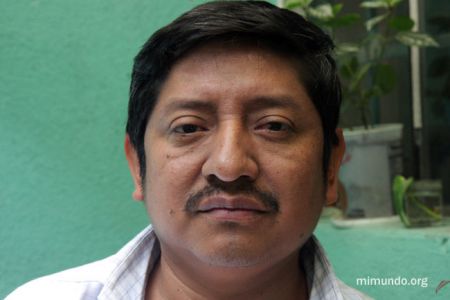They call him “the Hurricane.”
Guatemalan coffee farmer Leocadio Juracan (his family name is close to the Spanish word for hurricance) has had a special relationship with many Nova Scotians for many years – though most don’t even know it.
His coffee-farming cooperative – part of the CCDA (Comite Campesino Del Altiplano in Spanish, or Highland Peasant Farmers’ Committee), has been delighting local palates with its fair-trade, shade-grown organic coffee for close to 9 years, through a partnership with Just Us! Coffee roasters in Wolfville.
When Juracan speaks to audiences in Wolfville, Halifax and Tatamagouche this, however, the agenda will include more than just light vs. dark roasts.
According to Kathryn Anderson, Maritimes Coordinator of the Maritimes Guatemala Breaking the Silence (BTS) Solidarity Network, a long-time partner of the CCDA, the organization currently faces “perhaps the greatest threat to its existence since its founding” in 1982.
In May of 2008, Juracan explains, after signing an agreement with Guatemalan president Alvaro Colom on a framework for rural development, the CCDA’s car was shot at six times while driving down a rural road. The car’s passengers narrowly escaped injury.
"CCDA coffee is about more than fair trade prices for local producers,” says Jackie McVicar, Coordinator of BTS Guatemala and former Intern with CCDA. McVicar believes CCDA’s vehicle was targeted. “CCDA coffee implies political advocacy and ongoing work in the struggle for labour justice and access to land for thousands of Guatemalan peasants. This work is happening at both the grassroots and national level.”
Authorities chalked up the shooting to “common crime,” however, an assessment that may seem reasonable in a country with one of the highest violent crime rates in Latin America. But since then, the organization has suffered through 2 robberies in which a total of $40,000 worth of coffee was stolen; its leaders have received threats of murder and violence by letter and by phone; and there is generally a “climate of terror” surrounding the CCDA, says Juracan.
“The robbery and threats the CCDA received reflect an attempt to destabilize the organization and delegitimize the work they are doing,” says McVicar. “CCDA coffee isn't just about better wages, it's about changing structures of oppression."
In February, when the threats started to target Juracan’s children, he decided it was time to leave, at least for a while. With the help of some Canadian allies, he and his family discreetly left the country and found their way to Vancouver.
“If (the threats) had been just toward me,” Juracan says, “I would have kept on.”
A history of intimidation
The coffee grown by the CCDA – known as “Café Justicia” and sold to different roasters around the world – provides important capital for development projects, along with a fair wage for the farmers who tend it, says Juracan.
He lists home construction, a rural hospital, health promotion, training for midwives, teacher pay supplements, and educational scholarships as some of the CCDA’s ongoing projects.
But these “alternative” ways of doing things are threatening to some, explains Juracan. “Guatemala is not a poor country,” he says. “There is a sector of society that is extremely rich, that has appropriated the wealth of the country and excluded the majority of the population.”
This “oligarchy” has a vested interest in business as usual, says Juracan. He dismisses the theory that threats and attacks against the CCDA are the work of common criminals, noting that they always take place immediately after the group takes any sort of public political stance – criticizing the government for lack of action on land reform, for example, an issue for which resolution is decades overdue; or condemning the murder of unionists. “We connect [the attacks against us] to political acts.”
Residual violence from Guatemala’s 36-year civil war may also be a factor. The conflict, which divided communities and killed over 250,000 (mostly victims of the military and government-backed paramilitary groups), left a legacy of violence that has been hard for the country to shake. It is perfectly plausible, according to Juracan, that his attackers would have connections to wartime paramilitary groups.
Biding time
Juracan and his family aimed to return to Guatemala after 2 or 3 months, hoping that their security situation would improve. In the few weeks since they arrived in Canada, however, “there is no encouraging news,” says the campesino. “There is more news of harassment and intimidation, hooded men roaming the community, gunshots at night.”
During his time in Canada, Juracan says he would like to “generate conditions for a return” to his home country. Many CCDA member continue to work hard in Guatemala for political change, and he plans to “strengthen solidarity” between his group and concerned Canadians. Consuming Café Justicia – available as Just Us! Coffee’s Breaking the Silence Blend in Nova Scotia – makes possible the CCDA’s ongoing social justice work, he adds.
Still, says Juracan, he would rather his stay be as short as possible. Being forced out of his country for doing the work he lives for was “quite difficult.”
“There’s no way to express how you feel."
On March 19 at 7:30pm, Jurican will be speaking at Just Us! Cafe on Spring Garden Rd.



